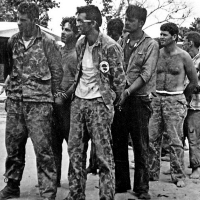50 Years Later, CIA Still Refuses to Release One Volume of Report on Invasion of Cuba
 CIA-supported Cubans captured during Bay of Pigs invasion (photo: Miguel Vonas, AFP/Getty Images)
CIA-supported Cubans captured during Bay of Pigs invasion (photo: Miguel Vonas, AFP/Getty Images)
The Central Intelligence Agency (CIA) has been granted the legal authority to refuse to release an historical report on the failed Bay of Pigs invasion more than 50 years ago.
The matter arose after the National Security Archive, a nonprofit historical organization at George Washington University, sued the CIA to obtain the last portion of an internal history about the April 1961 mission to overthrow Fidel Castro of Cuba.
The first four volumes of the report, written by CIA staff historian Jack Pfeiffer, have been released over the years. But the CIA refused to release the Volume V draft, claiming it was authorized under an exemption to the Freedom of Information Act to withhold the information. A final version of the report has not been produced.
The legal battle reached the U.S. Court of Appeals for the District of Columbia, where a divided panel of judges ruled 2-1 in favor of the CIA.
The majority opinion stated “that a draft of an agency’s official history is pre-decisional and deliberative, and thus protected under the deliberative process privilege.”
Judge Brett Kavanaugh did concede that “there may be no final agency document because a draft died on the vine.” That means the CIA could sit on the document indefinitely as long as it never finalizes the draft report.
“Looking backward, premature release of privileged information would risk embarrassment of individuals who had put forth certain ideas on the understanding and assurance that their communications would remain confidential,” Kavanaugh wrote. “To avoid such an unfair bait and switch, among other reasons, the Supreme Court has recognized that a privilege designed to encourage candid communications must be durable and lasting.”
Tom Blanton, director of the National Security Archive, expressed frustration about the ruling. “Presidents only get 12 years after they leave office to withhold their deliberations, and the Federal Reserve Board releases its verbatim transcripts after five years. But here the D.C. Circuit has given the CIA’s historical office immortality for its drafts, because, as the CIA argues, those drafts might ‘confuse the public,’” Blanton said in a prepared statement.
Appointed to the federal bench by President George W. Bush, Kavanaugh was a protégé of Kenneth Starr, the Republican independent counsel who investigated President Bill Clinton and recommended his impeachment.
Earlier in the 1990s, Kavanaugh conducted the Republican investigation into the suicide of Vincent Foster, a Clinton aide who killed himself. Conservatives accused the president of trying to cover up the death and even posited that the Clintons may have murdered Foster, a suggestion that was disproven by many investigators.
-Noel Brinkerhoff
To Learn More:
Court Tightens Lid Over Bay of Pigs Draft Report (by Barbara Leonard, Courthouse News Service)
CIA Successfully Conceals Bay of Pigs History (National Security Archive)
National Security Archive v. CIA (U.S. Court of Appeals, District of Columbia) (pdf)
11 Secret Documents Americans Deserve to See (by David Wallechinsky, AllGov)
- Top Stories
- Unusual News
- Where is the Money Going?
- Controversies
- U.S. and the World
- Appointments and Resignations
- Latest News
- Trump to Stop Deportations If…
- Trump Denounces World Series
- What If China Invaded the United States?
- Donald Trump Has a Mental Health Problem and It Has a Name
- Trump Goes on Renaming Frenzy






Comments